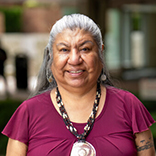What Patient Navigators Do
Contact Us
Anyone who has a non-medical issue that could keep them from getting care can ask for help from a patient navigator. To request an appointment, call the supportive care patient care coordinator or ask your provider or nurse to make a referral for you.
Phone: 206.606.1076
Going through cancer treatment can affect different areas of your life, such as your finances, work, relationships and daily routines. Fred Hutch Cancer Center patient navigators are culturally sensitive staff who are here to help you manage any non-medical needs you may have, so you can focus on taking care of yourself.
Our patient navigators often help patients with practical needs like finding transportation to and from medical appointments, helping them understand their health insurance or finding them a place to stay while they are being treated.
Patient navigators can be problem-solvers, helping patients who face complex issues that could make it harder to get care.
Patient navigators can also offer emotional support, empathy and wisdom. Many patient navigators at Fred Hutch have backgrounds like the patients they serve and have had personal experience going through cancer treatment — either themselves or supporting a family member or friend.
Helping Patients Get Equitable Care
Patient navigators are experts at supporting people and groups that have been historically underserved such as those in the black, indigenous and people of color (BIPOC) or lesbian, gay, bisexual, transgender, queer, intersex and asexual (LGBTQIA+) communities They respect each patient’s unique experience and help make sure they get care with dignity, diversity, trust and integrity. For example:
- If you are a part of an ethnic or cultural group or faith community that has certain beliefs or follows certain practices, your patient navigator can help you make sure those needs are met.
- If you or your family have limited income, your patient navigator can you help find resources that may help reduce financial barriers to care.
- If you speak a language other than English and your patient navigator needs to call you, they will use a phone interpreter service. Fred Hutch Interpreter Services can also ask interpreters to come to Fred Hutch for in-person visits.
If English is not your preferred language, you can read patient navigator information in another language by clicking the links below.
View Patient Navigator Information in Another Language
简体中文 - Chinese | 한국어 - Korean | Русский - Russian | Español - Spanish | Tagalog | Tiếng Việt - Vietnamese
Our Patient Navigators
At Fred Hutch, some patient navigators focus on working with specific groups of patients, like people with breast cancer or patients who prefer to speak Spanish. We also have a patient navigator who focuses on cancer survivorship. Others serve a wider group of patients and families. But, all of our patient navigators are experts at finding the best resources to help patients, caregivers and families impacted by cancer.
Sometimes these resources can be found right at Fred Hutch. Other times, they are out in the local community, like a social service agency or faith community. There are also many national organizations that can help our patients, and Fred Hutch patient navigators know how to find the best resources and support to help patients during their cancer treatment and beyond.

Yoel Claros-Ortiz

Vitalo Delucchi

Anne Devine
Focus: General Oncology Patients

Chloe Lunn-Fisher
Focus: Women's Center Patients

Anthony Nget
Focus: Asian/Pacific Islander Patients

Lynn O'Keefe
Focus: Community Sites and General Oncology Patients

Kiara Smith
Focus: Black/African American Patients

Lenora Starr
Focus: Indigenous and General Oncology Patients

Andrea Suzuki
Focus: General Oncology Patients (Bilingual in Spanish)

Renata Taylor
Focus: Women's Center Patients

Shavon Yingling
Focus: Blood and Marrow Transplant/Immunotherapy Patients
“My role as a patient navigator is meaningful to me because our work can truly impact the patient’s experience. They often have so many worries and stressors that it’s hard to feel any relief — offering resources or simply a friendly ear to listen can make all the difference in having a positive outcome.”
— Chloe Lunn-Fisher, Clinical Patient Navigator, Psychosocial Oncology
6 Most Common Ways Patient Navigators Can Help You
Here are six of the most common ways patient navigators support the patients and their families:
1. Medical lodging: If you live outside the Seattle area, you may need a place to stay while you are being treated at Fred Hutch. A patient navigator can help you find options that work for you and your family while you are being treated. Learn More
2. Medical transportation: A patient navigator may connect you to community organizations with volunteer drivers who help take people to medical appointments. There are also volunteer drivers through Fred Hutch who can drive you to and from the airport to the clinic. Patient navigators may also help you get discounted tickets on public transportation (like buses or light rail). Medicaid covers some travel costs for eligible patients, and a patient navigator can help you find out what costs are covered or not covered. Learn More
3. Health insurance: If you have limited income, a patient navigator can refer you to financial counseling to get help with applying for Medicaid and other programs. If you need information about Medicare and live in Washington state, they may refer you to an organization like Washington state’s Statewide Health Insurance Benefits Advisors (SHIBA) program. (If you do not live in Washington state, there may be other services in your home state that your navigator can refer you to.) They can also coach you on how to work with your medical plan and how to understand your medical bills.
4. Financial assistance: Fred Hutch offers financial help to patients who qualify, and a patient navigator can connect you to a financial counselor who can help you apply for assistance. A patient navigator can also tell you about community organizations that help patients with expenses related to cancer care. Learn More
5. Medication co-pays: Some medications for cancer are very expensive. A patient navigator can look up financial assistance programs and refer you to the appropriate programs for help with these costs.
6. Emotional support: Patient navigators provide reassurance and emotional support as patients and families go through treatment. They often refer patients to Fred Hutch social workers for counseling and share coping strategies that have helped patients like you. They can also provide information about support groups in the community that can be very helpful to patients and their caregivers.
How Patient Navigation Works
1. Request: To set up an appointment, call the supportive care patient care coordinator at 206.606.1076, or ask your provider or nurse to make a referral for you.
2. Assignment: You will be assigned a patient navigator who can help you. Sometimes, that person may come from a background that is similar to yours. No matter what, all Fred Hutch patient navigators are culturally aware and sensitive to the needs of patients from many different backgrounds.
3. Introduction: You will meet with the patient navigator, either in person, by phone or using telehealth (online). They will ask you questions about your situation to understand how they can help you. During this meeting, they may be able to give you information on community resources or resources at Fred Hutch that you can work with right away.
4. Assessment: After your first meeting, the navigator will put together a plan to help with your most urgent needs. They may also do research and talk to navigation and social work colleagues to find more resources for you.
5. Follow-up: Your needs may change over time. During your assessment, your patient navigator may notice issues that could become a challenge for you later. They will give you helpful information on community resources, support groups and educational programs that can help you. And you can always call, send a MyChart message or email your patient navigator with questions at any time.
Frequently Asked Questions
Patient navigators are here to help reduce any type of barrier to care a person might have. Patient navigators often help with questions about finances, transportation, finding a place to stay during treatment and understanding health insurance. If they do not have the answer right away, the patient navigator will use their resources and network to find someone who does.
Patient navigators and nurse navigators have different roles and responsibilities. Patient navigators help patients manage the impact of cancer on their daily life. Nurse navigators help patients with coordinating their medical care before their first appointment.
No. Patient navigators are not a source for medical information. However, if you have questions about your medical care or if there is something you do not understand, your navigator can talk to your medical care team and let them know what your questions are.
Anyone who is going through treatment at Fred Hutch can ask for patient navigation services. For example, patients whose first language is not English may want to work with a patient navigator to get an interpreter, or if a family has limited financial resources, a patient navigator can guide them to information and resources that can help. Also, patients who need help understanding their rights as employees (FMLA), available sources of support (Wshington Paid Family and Medical Leave) and how to manage the complex health care system can get patient navigation services.
Fred Hutch patient navigator services are free for patients, families and caregivers.
No. But your patient navigator can refer you to Fred Hutch’s Financial Services Department, where they can help you understand the financial aspects of your care, such as co-pays, or answer billing questions. Our navigators can also coach you in how to communicate with your health insurance carrier.
Yes, patient navigators can let you know about transportation options to and from your appointments.
Yes. Patient navigators support patients as well as families and caregivers with guidance, resources and practical support throughout their loved one’s treatment.
When you ask to work with a patient navigator, let us know what language you speak. Our team has access to phone interpreters. Also, Fred Hutch has an Interpreter Services Department with resources that can help.
Resources
In addition to the resources your patient navigator recommends for you, here are some other places you can explore to find information and support.
- Classes and Events
- Financial Assistance
- Interpreter Services
- Resources Grouped by Disease and Categories
- Support Groups
- Travel Assistance